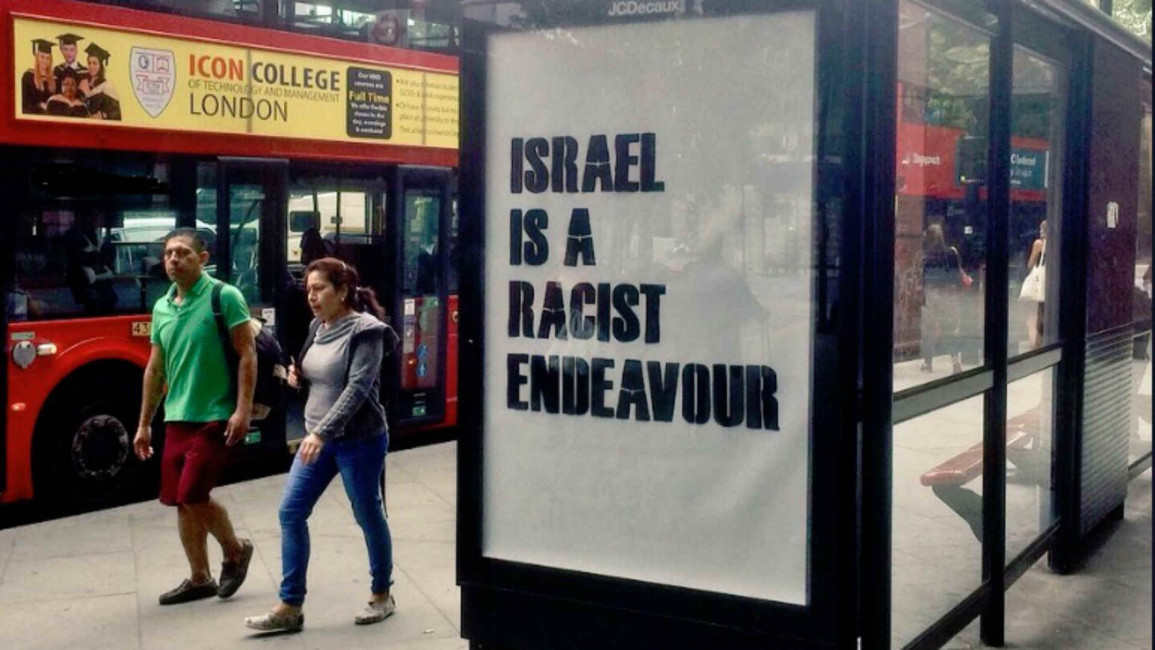
Anti-Semitism and UK Labour: What now for Palestine solidarity?
Anti-Semitism and UK Labour: What now for Palestine solidarity?
Comment: The gradual criminalising of Palestinian activism is being countered by grassroots campaigners, writes Malia Bouattia.
5 min read
'Subvertisements' have been appearing across London [Twitter]
After lengthy public debates and attacks over criticisms of the International Holocaust Remembrance Alliance's definition of anti-Semitism, the Labour Party's National Executive Committee (NEC) has overwhelmingly voted in favour of its adoption, by 205 in favour to just eight against.
The controversy over the document has centred around the examples that illustrate the definition and that equate describing the creation of the state of Israel as a racist endeavour with anti-Semitism.
Indeed, under the newly adopted IHRA examples, describing the displacement of hundreds of thousands of Palestinians, the destruction of hundreds of villages, and the placing of those who stayed behind under military rule because of their ethnicity/nationality will be considered an attack on Jewish people everywhere.
Not only is this a dangerous normalisation of the anti-Semitic trope that equates Zionism with Jews, it is also a dangerous move directed at silencing Palestinians and their right to describe their ongoing oppression accurately.
In order to address this issue, perhaps even to square the circle, and although the NEC initially voted against adding a short text proposed by Labour leader Jeremy Corbyn, a revised clarification document was eventually accepted.
The attachment to the policy emphasised that despite the decision to accept the IHRA definition, it should not "be regarded as anti-Semitic to describe Israel, its policies or the circumstances around its foundation as racist because of their discriminatory impact, or to support another settlement of the Israel-Palestine conflict".
This invited criticism from groups such as Labour Friends of Israel (LFI) who stated that the party "appears determined to provide a safe space for anti-Semites" and Labour Against Anti-Semitism saying it "appears to be about protecting the freedom of racists to present vile views".
What is extraordinary about these criticisms is how, once again, they single out the Labour Party and its leadership without acknowledging the much more broadly held unease about the IHRA definition and examples.
So far, for example, both the Scottish and Welsh government have accepted the definition without examples, while the Home Affairs Select Committee on Anti-Semitism - a body led by Conservative politicians - recommended that the IHRA definition be clarified before adoption "in order to ensure that freedom of speech is maintained in the context of discourse about Israel and Palestine".
The decision by the Labour NEC is an important setback for all Palestine activists, anti-racist campaigners, and those who continue to believe that a progressive project in the UK that leaves a serious and committed anti-imperialist politics behind, will not be a progressive project at all.
Equating the accurate description of the violence and oppression of the Palestinian people at the hands of the Israeli state with racism sends a dangerous message in that direction.
The Labour Party has a long history of supporting the British state's interests around the world, against the populations concerned. This is not only true in the case of Palestine, but similar historical support for the British Empire, or more recent military interventions in Iraq and Afghanistan, are written in the history of the party.
It is therefore as much the task of a new, revitalised Labour Party to break with those traditions as it is to abandon Blairite neoliberal economics. Refusing to do so sends a worrying message to people of colour, and global south communities in the UK that our liberation, our rights, and our suffering continue to be considered either unimportant, or at least of secondary interests, and even - as in this case - liable to being silenced all together.
It is therefore unsurprising that this decision has left anti-racist activists, who are in solidarity with the Palestinian struggle for liberation, wondering what next, and afraid to imagine how such a policy will be applied in the face of attempts to hold Israel to account for its violations of international law, as it maintains its illegal occupation, blockade and settlement expansions.
How will this impact BDS activists, Palestinian scholars and public figures, or concerned members of the Labour Party who continue to place central importance on the Palestinians' right to describe their dispossession and oppression accurately, and to take demand justice and reparations? What will their place be in the months to come inside the Labour Party and the UK left?
It may feel all too simple to say that we have to keep fighting, but that's exactly what we must do. Both within the Labour Party, and across society, it must be made clear through our campaigns that Israel's continued colonisation of Palestine is unquestionably wrong and that the targeting of a people, any people, based on its national, ethnic, racial, or religious characteristics is unquestionably bigoted and racist.
That is why the recent action taken by London Palestine Action was so significant. It publicly made clear that the racist practices of the Israeli state will not be buried under any policy and that grassroots movements in the UK will continue to fight back.
Indeed, the morning that followed the NEC's vote, central London bus stops were transformed including in Westminster, Bloomsbury and Waterloo. Posters that replaced the usual advertisements read "Israel is a racist endeavour". The action was organised by the London Palestine action group which added via Twitter: "We won’t stop speaking the truth: that Israel is, and always has been a #racistendeavour" and "created by ethnic cleansing; maintained by ethnic exclusion. Israel is a #racistendeavour".
This immediate act of defiance captures an important element of the current reality. While pressure from above is increasingly moving to criminalise Palestine activism - think for example of the attempts in France, the UK, and the US to make BDS illegal entirely or in parts - the grassroots solidarity with the Palestinian people continues to strengthen.
Just look to the growing list of musicians who are refusing to perform at the Meteor festival in Israel which has shown that recent public discourse has shifted considerably towards a refusal to accept continued colonisation and oppression of the people of Palestine and a commitment to solidarity and justice.
It is this movement that must be built, developed, and strengthened. It is its strength that will determine what happens to the countless Palestine solidarity activists in the Labour Party. And it is its strength that will determine the political space for Palestinians and other global south communities to continue to present, articulate, and fight their oppression - until victory.
Malia Bouattia is an activist, a former president of the National Union of Students, and co-founder of the Students not Suspects/Educators not Informants Network.
Follow her on Twitter: @MaliaBouattia
Opinions expressed in this article remain those of the author and do not necessarily represent those of The New Arab, its editorial board or staff
The controversy over the document has centred around the examples that illustrate the definition and that equate describing the creation of the state of Israel as a racist endeavour with anti-Semitism.
Indeed, under the newly adopted IHRA examples, describing the displacement of hundreds of thousands of Palestinians, the destruction of hundreds of villages, and the placing of those who stayed behind under military rule because of their ethnicity/nationality will be considered an attack on Jewish people everywhere.
Not only is this a dangerous normalisation of the anti-Semitic trope that equates Zionism with Jews, it is also a dangerous move directed at silencing Palestinians and their right to describe their ongoing oppression accurately.
In order to address this issue, perhaps even to square the circle, and although the NEC initially voted against adding a short text proposed by Labour leader Jeremy Corbyn, a revised clarification document was eventually accepted.
The attachment to the policy emphasised that despite the decision to accept the IHRA definition, it should not "be regarded as anti-Semitic to describe Israel, its policies or the circumstances around its foundation as racist because of their discriminatory impact, or to support another settlement of the Israel-Palestine conflict".
Twitter Post
|
This invited criticism from groups such as Labour Friends of Israel (LFI) who stated that the party "appears determined to provide a safe space for anti-Semites" and Labour Against Anti-Semitism saying it "appears to be about protecting the freedom of racists to present vile views".
What is extraordinary about these criticisms is how, once again, they single out the Labour Party and its leadership without acknowledging the much more broadly held unease about the IHRA definition and examples.
So far, for example, both the Scottish and Welsh government have accepted the definition without examples, while the Home Affairs Select Committee on Anti-Semitism - a body led by Conservative politicians - recommended that the IHRA definition be clarified before adoption "in order to ensure that freedom of speech is maintained in the context of discourse about Israel and Palestine".
The decision by the Labour NEC is an important setback for all Palestine activists, anti-racist campaigners, and those who continue to believe that a progressive project in the UK that leaves a serious and committed anti-imperialist politics behind, will not be a progressive project at all.
Twitter Post
|
Equating the accurate description of the violence and oppression of the Palestinian people at the hands of the Israeli state with racism sends a dangerous message in that direction.
The Labour Party has a long history of supporting the British state's interests around the world, against the populations concerned. This is not only true in the case of Palestine, but similar historical support for the British Empire, or more recent military interventions in Iraq and Afghanistan, are written in the history of the party.
It is therefore as much the task of a new, revitalised Labour Party to break with those traditions as it is to abandon Blairite neoliberal economics. Refusing to do so sends a worrying message to people of colour, and global south communities in the UK that our liberation, our rights, and our suffering continue to be considered either unimportant, or at least of secondary interests, and even - as in this case - liable to being silenced all together.
It is therefore unsurprising that this decision has left anti-racist activists, who are in solidarity with the Palestinian struggle for liberation, wondering what next, and afraid to imagine how such a policy will be applied in the face of attempts to hold Israel to account for its violations of international law, as it maintains its illegal occupation, blockade and settlement expansions.
 |
It may feel all too simple to say that we have to keep fighting, but that's exactly what we must do |  |
How will this impact BDS activists, Palestinian scholars and public figures, or concerned members of the Labour Party who continue to place central importance on the Palestinians' right to describe their dispossession and oppression accurately, and to take demand justice and reparations? What will their place be in the months to come inside the Labour Party and the UK left?
It may feel all too simple to say that we have to keep fighting, but that's exactly what we must do. Both within the Labour Party, and across society, it must be made clear through our campaigns that Israel's continued colonisation of Palestine is unquestionably wrong and that the targeting of a people, any people, based on its national, ethnic, racial, or religious characteristics is unquestionably bigoted and racist.
Twitter Post
|
That is why the recent action taken by London Palestine Action was so significant. It publicly made clear that the racist practices of the Israeli state will not be buried under any policy and that grassroots movements in the UK will continue to fight back.
Indeed, the morning that followed the NEC's vote, central London bus stops were transformed including in Westminster, Bloomsbury and Waterloo. Posters that replaced the usual advertisements read "Israel is a racist endeavour". The action was organised by the London Palestine action group which added via Twitter: "We won’t stop speaking the truth: that Israel is, and always has been a #racistendeavour" and "created by ethnic cleansing; maintained by ethnic exclusion. Israel is a #racistendeavour".
This immediate act of defiance captures an important element of the current reality. While pressure from above is increasingly moving to criminalise Palestine activism - think for example of the attempts in France, the UK, and the US to make BDS illegal entirely or in parts - the grassroots solidarity with the Palestinian people continues to strengthen.
Just look to the growing list of musicians who are refusing to perform at the Meteor festival in Israel which has shown that recent public discourse has shifted considerably towards a refusal to accept continued colonisation and oppression of the people of Palestine and a commitment to solidarity and justice.
It is this movement that must be built, developed, and strengthened. It is its strength that will determine what happens to the countless Palestine solidarity activists in the Labour Party. And it is its strength that will determine the political space for Palestinians and other global south communities to continue to present, articulate, and fight their oppression - until victory.
Malia Bouattia is an activist, a former president of the National Union of Students, and co-founder of the Students not Suspects/Educators not Informants Network.
Follow her on Twitter: @MaliaBouattia
Opinions expressed in this article remain those of the author and do not necessarily represent those of The New Arab, its editorial board or staff




